- Home
- Francine Mathews
Death in a Cold Hard Light
Death in a Cold Hard Light Read online
PRAISE FOR FRANCINE MATHEWS
“Nantucket and its impenetrable, secretive fog and characters come to life in Mathews’ capable hands.”
—Diane Mott Davidson, author of Prime Cut
AND HER NANTUCKET ISLAND MYSTERIES
DEATH IN A MOOD INDIGO
“Outstanding … Mathews is a dazzling talent indeed. This book has it all—fascinating, beautifully drawn characters, such a realistically rendered setting that you can hear the waves as you read, page-turning suspense, the struggle of good vs. evil so skillfully brought to the forefront that I’ll be thinking about the issues that the book raised for a long time to come…. A must read for those who appreciate fully realized, believable characters and a strong sense of place.”
—Mystery News
“An exploration of the very nature of evil…. Bright, determined, and yet vulnerable, Merry is an appealing heroine … sensitively drawn … memorable.”
—The Denver Post
“A smart, savvy, appealing heroine who’s definitely worth getting to know … One more fine entry in a series that just keeps getting better.”
—Booklist
“The detection is first-rate, sadly a rarity in many crime novels these days. Mathews dares you to guess the killer, and so do I.”
—The Plain Dealer, Cleveland
DEATH IN ROUGH WATER
“Refreshing island atmosphere, believable villainy, and down-to-earth sleuthing.”
—Kirkus Reviews
“An enticing read.”
—The Denver Post
“Mathews offers a nice blend of island lore and contemporary connivers, a … twisty plot and a dogged heroine.”
—The Armchair Detective
“Mathews skillfully incorporates close-knit relationships, small-town gossip and a salty Nantucket flavor as she steers this intricate tale to a satisfying conclusion.”
—Publishers Weekly
Other Mysteries by Francine Mathews Featuring Merry Folger
DEATH IN THE OFF-SEASON
DEATH IN ROUGH WATER
DEATH IN A MOOD INDIGO
and
The Jane Austen Mystery Series by Francine Mathews Writing as Stephanie Barron
JANE AND THE UNPLEASANTNESS AT SCARGRAVE MANOR
JANE AND THE MAN OF THE CLOTH
JANE AND THE WANDERING EYE
JANE AND THE GENIUS OF THE PLACE
Look for THE CUT-OUT by Francine Mathews coming soon in hardcover from Bantam Books!
Dedicated with love to my sister,
Patricia Anthony,
who always knew the Cape was home.
Chapter One
The cold hard light of a December dawn hung heavily over Nantucket Sound, turning the sea opaque and alien. It clung to the church spires and curled like smoke along the gray-shingled eaves of the huddled houses. It flew on the spines of maple leaves as they skittered lonesomely down the length of Main Street, and cast a rime of frost over the lettering carved deep in the cemetery’s timeworn headstones. The sadness at the edge of the blanketing clouds made the few scallop boats in the harbor seem even dingier and more futile as they dredged less with every cast from the slowly dying shallows.
Beyond Brant Point and the stone jetties thrusting bravely out to sea, a curtain of freezing rain obscured the approaching ferry. It was the first boat of the day—the first boat of a holiday weekend—but there was no one, really, to observe its arrival. Just a log half-submerged in the harbor’s chop, seaweed streaming from one end like a tangle of human hair.
The captain of the Steamship Authority’s M/V Eagle sighed deeply at the last of his coffee and dabbed an ineffectual towel over his fogged windows. Ted Moran had been awake since three A.M. The wife he had left behind in Hyannis was habitually unkind to him. His wool socks were damp and his toes were chilled. He was worried, as usual, about money. And as he gazed out over the dispiriting Sound, he felt the weight of that hard cold light settle as quietly as a gull on his slumped shoulders. It folded its wings and prepared to stay.
Captain Moran expelled a deliberate breath against the glass. The sourness of his own coffee churned with the odors of dust and exhaust and burning rubber that pervaded the ship. He grimaced and thrust open a porthole to one side of his control panel. The briny wind dispersed the interior funk. The captain turned his face to the sky and looked out over the tourists’ heads grouped in the bow below his perch. They were craning, inevitably, for the first glimpse of Brant Point Light. Moran’s gaze moved beyond them, and registered the log.
It bobbed with a sharp, wooden gracelessness in the waves, as though attempting to keep time to another man’s music. And it was drifting directly in the steamship’s path as it approached the harbor channel marked by the stone jetties.
Moran swore aloud, then adjusted the Eagle’s controls a hairsbreadth. The ferry’s massive hull would hardly register the impact of even a sailboat thrown in its way, but he preferred to avoid obstacles when he could. The Eagle began its turn to port, nosing into the channel, and the bow wave shoved the piece of driftwood sideways into the starboard jetty. Spume broke over the jagged breakwater. The log rolled upward—and showed a pallid, mortal face beneath the streaming weeds of its hair.
“Jesus,” Moran whispered; and at that very moment, the tourists began to scream.
The chief of Nantucket’s police, John Folger, usually awoke a few seconds before the first car ferry of the day rounded Brant Point and blared its horn into the stillness. Like the ebb and flow of the tide, the ferry horn was a predictable sort of chaos. The sound came and went at scheduled intervals, punctuating the island hours in much the way that the Angelus had once divided the devotional day. As if in genuflection to that thought, Chief Folger said a fragmentary prayer into the cold hard light that filled his bedroom, closed his eyes, and waited. The blow of the ferry’s horn came just as he ceased to expect it—a long, multitoned, earsplitting bray. When the last note had died away, he swung his feet to the bare plank floor. And at almost the same moment, like the ferry’s strident echo, his bedside telephone rang.
“Hey, Chief,” Terry Samson said. The bosun’s mate greeted him from the doorway of the Brant Point Coast Guard station, his mouth set in a thin line. “Sorry to pull you out of bed, I thought I’d get your daughter.”
“Meredith is off-island. Boston trial lawyers, again.” John shook Terry’s hand, unwilling to say more. For the past eight months, the prosecution of the worst killer in Nantucket’s history had dominated Merry’s life, and the burden showed little sign of easing. They would all be relieved when the trial—with its white glare of publicity, its endless prevarication and legerdemain—was at long last behind them. John no longer hoped desperately for justice; that was something for the victims’ families to pursue. What he wished for now was far more elusive—a measure of forgetting, for himself and Meredith. “And everybody else is assigned to something today,” he added. “Christmas Stroll, you know. So I thought I’d handle this myself.”
“Right.”
The Chief looked beyond Terry Samson to the gray water of the harbor. Santa was due to arrive on-island by boat tomorrow. If they had to find a body, thank God they’d found it today.
For the past twenty-odd years, the first weekend in December had brought Christmas to Nantucket. What had begun as a Chamber of Commerce gimmick—promote the island off-season, and lure a boatload of tourists to do their Yuletide shopping on historic Main Street—had quickly turned into a cheerful community extravaganza, so that now John wondered what they had ever done for the holidays before Christmas Stroll began. There were tours of venerable houses and candlelight walks, roving bands of costumed carolers and concerts in the naves
of churches. The local inns mulled vats of cider and kept their fireplaces roaring; art galleries mounted special shows; and shop windows gleamed with Christmas balls spilling artfully from dories and sea captains’ chests. Tourists arrived by the plane- and boatload, to walk the deserted lanes in heavy sweaters, gaze out at the forbidding sea, and tramp back over the dunes for bowls of steaming quahog chowder. They nursed single-malt Scotches from the depths of their armchairs. They spent far too much money on lightship baskets and antique brass barometers and hand-loomed throws. They bought Nantucket Reds baseball caps and twill trousers and wore jackets embroidered with small blue whales. And then, like a flock of migratory fowl, they left—as though, John Folger thought, money could buy what was precious about Nantucket, and sustain the exiles through the doldrums of winter.
The first of the tourists had probably already arrived on the morning ferry, and witnessed the Eagle captain’s frantic call to the Coast Guard—had witnessed, perhaps, Terry Samson’s retrieval of the body. Old news by lunchtime.
“Where is he, Terry?”
The bosun’s mate gestured toward the water. “Out back at the boat dock. We didn’t want to unload him under the eyes of the entire town. Particularly this weekend.”
“No. Poor bastard. We’ll take him off your hands as soon as we can.”
Terry led the Chief through the station’s central hall. Beyond the double doors at the back lay a patch of grass, dirty brown and unlovely in the late autumn wind. The two men crossed it and came to the Coast Guard’s working dock—a couple of slips for cutters, a boat ramp to one side, and beyond it, the horseshoe curve of the island’s harbor. On the deck of the far cutter lay a tarpaulin-shrouded mass.
“Any identification?”
“We didn’t look.” Terry shoved his cap upward and fingered his hairline. “I guess I thought you’d want to do that yourself.”
John Folger grunted. He sprang from dock to gunwale, reaching haphazardly for the support of a stanchion. Despite living awash in the seas for nearly sixty years, he had never been a sailor. He wavered for an instant, fell heavily into the body of the craft, and steadied himself. Then he made his way to the corpse and pulled back the tarp.
“God damn,” he said. “Holy mackerel.”
Terry jumped into the boat beside him. “What’s wrong?”
Other than a kid lying dead who shouldn’t have died—nothing at all, Folger thought. Nothing to speak of, in fact. Oh, Christ.
The police chief stood silent and frowning over the body for a moment, just taking it all in. Long wet hair the color of old rope hung in hanks about the blue-tinged face. He usually wore it in a ponytail, John remembered, but the hairband must have disappeared in the water. A dark mole punctuated the right cheek. One hazel eye stared remotely, but the other had been torn from its socket—by a crab, probably, near the wharf pilings where the body might have entered the water. His nose had been chewed up, too. But there was no other visible sign of violence. John Folger closed his eyes, shock giving way to anger, and felt suddenly sick.
“Chief?” Terry Samson prodded.
“I’ve got to use your phone,” Folger said.
And called the Water Street station.
“Such a sweet girl.” Julia Mason set down her coffee cup and smiled brilliantly across the breakfast table at Meredith. Folger. “So ambitious, too. But then, the sort of woman who survives a Princeton education is of a different breed—wouldn’t you agree? Beauty and brains, with spirit into the bargain. A certain je ne sais quoi in her air and address, her familiarity with all levels of society. Where did you say you attended college, dear?”
“Cape Cod Community.” Merry’s jaw felt stiff, as though it were slowly turning to stone. But then, her entire body was tensed for the receiving of a blow. Her neck ached from the effort of keeping her head upright, her eyes fixed on Peter’s mother.
“And that was for—two years?”
“Yes. I went to the police academy afterward.”
“Ah.” Julia dusted her manicured fingertips with a linen napkin. “Yes—we all thought that Alison would have been perfect for Peter. I simply do not understand young people today. They seem to consider no one but themselves.”
Merry had to agree with Julia; for her part, she had barely spared a thought for Alison Miller in the four years since she had saved the woman’s life—but in Julia Mason’s mind, at least, Alison was the standard against which Merry should be judged. Probably, Merry thought, because Alison had been wise enough to quit the Mason field rather than tackle Peter’s mother.
“So very sad in every respect that things fell out as they did,” Julia continued.
“Particularly for Alison.” Georgiana Whitney reached for a scone and then passed the pastry tray to Merry. Like everything in the Greenwich house, it was a study in elegance. “That girl had a talent for making lousy choices. Peter, however, generally makes brilliant ones. I haven’t seen him so happy in years.”
Merry managed a crooked smile. She had instinctively liked Georgiana Whitney from the moment Peter’s sister had opened the door of her Round Hill home the previous afternoon. George was lithe and dark, with glowing eyes and a glossy cap of hair that reminded Merry of a mink. She moved with an almost feral grace—years of ballet lessons embedded in the bone—and a contained energy that might have powered the space shuttle. Her four children roared about the high-ceilinged rooms and clattered up the back staircase, leaving heaps of winter clothing, ice skates, and dog leashes in the front hall; but George moved serenely through the chaos like the very best of good witches. Her love for her family, and for her world in general, was obvious. And yet there was hidden strength in the woman’s whipcord body, Merry decided. She certainly managed her mother the way a New York tugboat guided a barge.
“So tell me,” George said now, leaning forward conspiratorially. “Are you planning a summer wedding? On the island?”
Merry shifted uneasily in her chair. “We haven’t actually decided.”
“But none of Peter’s friends will be there!” Julia protested. “None of the ones that count. His old friends, the people he knew before he met—” She hesitated, and studied Merry for a long moment. “None of his real friends, I mean.”
“Since when is Nantucket a backwater in August?” George asked the table in general. “Half of Manhattan would kill for an excuse to fly in. The other half will already be there.”
“But why not save all that effort and have the wedding here? Or better yet, at the Plaza downtown?”
“I doubt Peter would be comfortable with the Plaza, Mother.”
Julia said nothing in reply; then she shrugged her indifference. “Oh, well, if you insist on making it a horrid little shotgun affair …perhaps at least Sky Tate-Jackson and his wife—what is that creature’s name? Maymay? Chinese or Korean or something?—might manage to attend.”
“I only asked, Merry, because of the house,” George continued, ignoring her mother.
“The house?”
“Cliff Road. You know. We’re there every summer with the kids. And Hale and I were thinking—if you wanted to use the backyard for the reception, tent it over with a dance floor and everything—we’d be delighted. But we should start planning now. Those sorts of services get tied up quickly in the summer months.”
The Cliff Road house. With its narrow clapboard facade and divided front steps, it had sat for one hundred seventy years behind perfect lygustrum hedges, a masterpiece of the Federal style. Crushed quahog shells lined the drive and the path to the door, and in summer, hydrangeas welled over the lawn in every shade of blue-pink, like a Laura Ashley photo shoot. The back terrace ran straight to the bluff’s edge, and below it lay the crowd of cottages near Jetties Beach, the long smooth expanse of Nantucket Sound. Merry had been inside the home only once, the previous January, when she and Peter had stopped to check the pipes. Chinese red walls in the hallway, black and white marble on the floor. A treasure trove of export ware. Mahogany and Chippendal
e. Turkish carpets strewn over the heart-pine floorboards. A house in the Potentate style.
She tried to imagine Peter’s foreman, Rafe da Silva, kicked back with a beer on one of the Cliff Road house’s lawn chairs—and failed.
“So lovely,” Julia Mason sighed, “when we held the engagement party there. Tubs of hydrangeas around the tent poles, and Alison a picture in white organza—”
“Excuse me,” Merry said, rising abruptly from the table. “I think I hear Peter coming in.”
“Pity,” Julia remarked to George as her prospective daughter-in-law beat a hasty retreat, “that she has so little to say for herself. Peter used to love witty women.”
He had just returned from his morning run. He stood in his sister’s back hall with his face flushed from the cold. At the sight of Merry, he grinned and enfolded her in an exuberant hug.
“You stink,” she said, “and I don’t even care. That says something, I think.”
“About your love for me?”
“Or my hatred of your mother.”
“That bad, huh?” Peter released her and busied himself removing his shoes and sweatshirt. “Isn’t George any help?”
“She’s trying. But this is Julia Mason we’re talking about—the Rommel of the Social Register. And the assault on North Africa has only begun.”
“I see. You’re ready to leave.”
“Pretty much,” Merry replied equably. “If she mentions your lovely and talented ex-fiancée again, I may just settle for drawing blood.”
“Three days.” Peter looked at her then, his gray eyes brilliant beneath his sharp brows. “Three days of touring my childhood haunts, making friends with George, and ignoring Mother. Then we hit the city, take in a few shows, and pick a china pattern at Tiffany’s.”

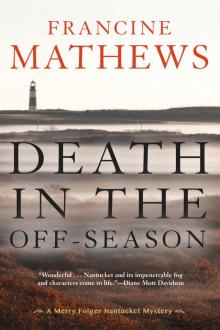 Death in the Off-Season
Death in the Off-Season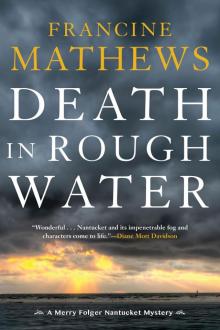 Death in Rough Water
Death in Rough Water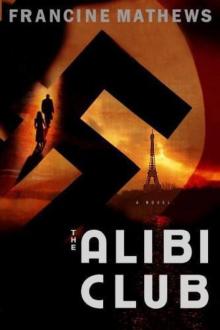 The Alibi Club
The Alibi Club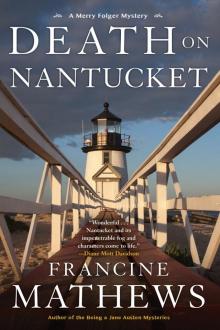 Death of a Wharf Rat
Death of a Wharf Rat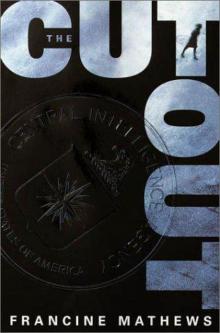 The Cutout
The Cutout The Secret Agent
The Secret Agent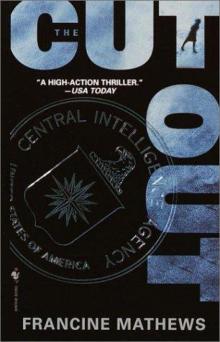 The Cutout cc-1
The Cutout cc-1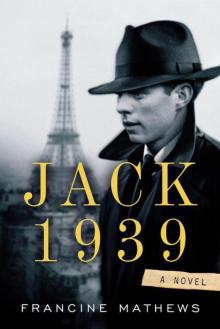 Jack 1939
Jack 1939 Death in a Cold Hard Light
Death in a Cold Hard Light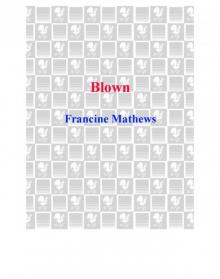 Blown
Blown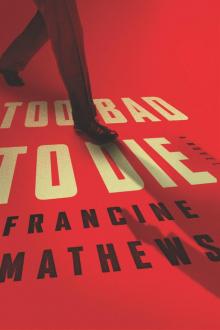 Too Bad to Die
Too Bad to Die